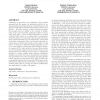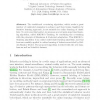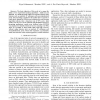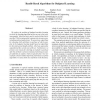ATAL
2007
Springer
15 years 8 months ago
2007
Springer
Classically, an approach to the multiagent policy learning supposed that the agents, via interactions and/or by using preliminary knowledge about the reward functions of all playe...
108
click to vote
AI
2007
Springer
15 years 8 months ago
2007
Springer
Agent competition and coordination are two classical and most important tasks in multiagent systems. In recent years, there was a number of learning algorithms proposed to resolve ...
ACCV
2007
Springer
15 years 8 months ago
2007
Springer
The traditional co-training algorithm, which needs a great number of unlabeled examples in advance and then trains classifiers by iterative learning approach, is not suitable for ...
SMC
2007
IEEE
15 years 8 months ago
2007
IEEE
— The basic objective of this work is to assess the utility of two supervised learning algorithms AdaBoost and RIPPER for classifying SSH traffic from log files without using f...
105
click to vote
ICDM
2007
IEEE
15 years 8 months ago
2007
IEEE
We explore the problem of budgeted machine learning, in which the learning algorithm has free access to the training examples’ labels but has to pay for each attribute that is s...
108
click to vote
FUZZIEEE
2007
IEEE
15 years 8 months ago
2007
IEEE
— The application of Qualitative Reasoning to Learning Algorithms can provide these models with the capability of automate common-sense and expert reasoning. Learning algorithms ...
109
click to vote
FOCI
2007
IEEE
15 years 8 months ago
2007
IEEE
— Backpropagation through time is a very popular discrete-time recurrent neural network training algorithm. However, the computational time associated with the learning process t...
114
click to vote
ICRA
2008
IEEE
15 years 8 months ago
2008
IEEE
Abstract— Learning inverse kinematics has long been fascinating the robot learning community. While humans acquire this transformation to complicated tool spaces with ease, it is...
130
Voted
CIKM
2009
Springer
15 years 8 months ago
2009
Springer
Understanding intents from search queries can improve a user’s search experience and boost a site’s advertising profits. Query tagging via statistical sequential labeling mode...
140
click to vote
CVPR
2010
IEEE
15 years 10 months ago
2010
IEEE
Multiple instance (MI) learning is a recent learning paradigm that is more flexible than standard supervised learning algorithms in the handling of label ambiguity. It has been u...






